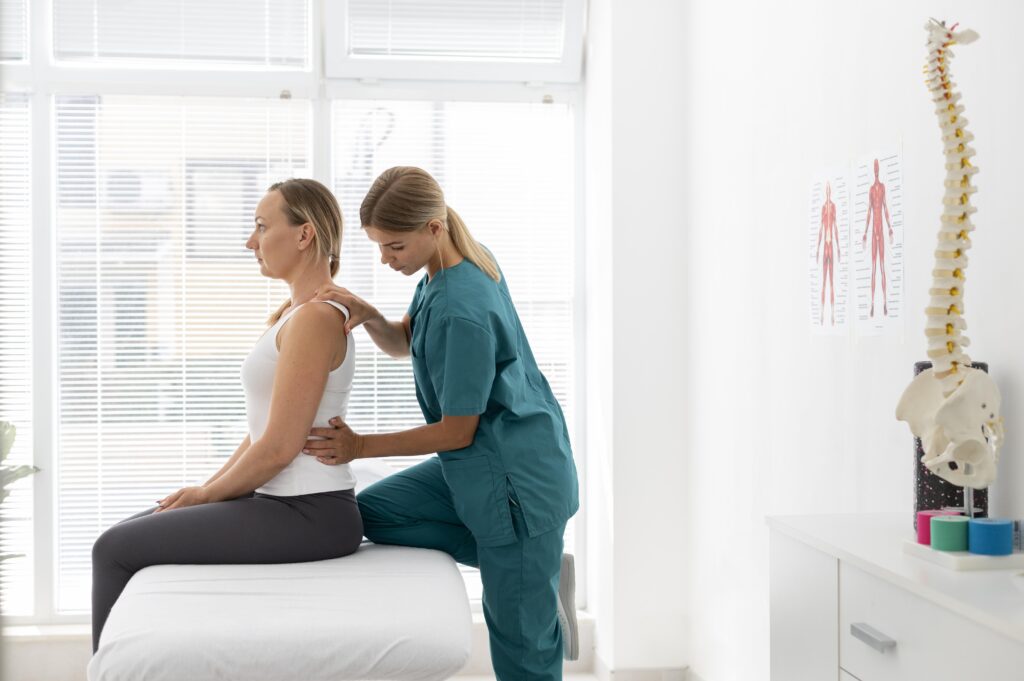Pinched Nerve Treatment in Malvern

People with pinched nerves are more likely to experience:
- A “pins and needles” sensation
- Numbness or decreased sensitivity in your arm, leg, fingers, or toes
- A weakness of your muscles
- Sharp, shooting pain down your arm or leg
- Muscle tightness, cramping or spasms
- Discomfort when trying to sleep
- More pain with sitting or driving
When to Seek a Pain Solutions for Pinched Nerves
Could the numbness, tingling, pain, or weakness you’re experiencing be caused by a pinched nerve? Pinched nerves are common, affecting people of all ages. While ice, stretching, and rest can help, if your symptoms don’t go away within a few days, it may be worth turning to an expert to find out what’s going on.

How Aligned Medical Group Can Help You Find Pain Solutions for Pinched Nerves
Our approach begins with a thorough exam. We want to understand not only which nerve is being pinched, but where it’s pinched, and all the factors that led to your nerve getting pinched to begin with. Uncovering things like arthritis, harmful medications, posture habits, ranges of motion, or areas of previous surgery or injury with scar tissue, are just a few factors to be considered. The more information the better, so we can get you fast relief and a solution-focused plan, so the problem is fixed and does not return.
Once we have an accurate diagnosis, we put together recommendations using a variety of pinched nerve care options from the different specialists on our team. Medical factors such as blood sugar levels, vitamin and mineral balance, and the function of your circulatory system are just a few things we’ll look at because they may impact your nerve getting pinched and how it can heal.
Our Pinched Nerve Care Includes:
Medication
In our practice, we minimize the use of medications, but pinched nerves can be serious so sometimes medication is an important part of recovery. Anti-inflammatory medication can help reduce pressure on the nerve by reducing inflammation. Reducing inflammation also may help reduce pain. We are conservative with how much medication we recommend since the regular use of anti-inflammatories slows your normal healing process. For severe symptoms, we may recommend steroids for pinched nerve care. We try to avoid the use of steroids because of the potential side effects, however, they play an important role in recovery for more severe cases.
Another beneficial medical treatment is injections into tight muscles, called trigger point injections. A natural substance called Sarapin has a calming effect on nerves and helps reduce tightness in stubborn, knotted muscles.
Vax-D Spinal Decompression
Vax-D Spinal Decompression Therapy uses an advanced traction treatment table. The cervical spine (neck) and lumbar spine (lower back) are the two areas that can be treated. While the treatment can greatly help a pinched nerve in the lower back or neck area, the treatment targets spinal discs. A damaged or weak spinal disc can bulge (disc sticks out mildly), protrude (disc sticks out in finger-like manner), herniate (larger than a bulge), or extrude (disc ruptures and inside spills out). Any of these disc conditions will reduce space around adjacent spinal nerves, and potentially pinch the nerve.
Traditional traction tables have a patient laying on their back, while a harness is attached to the waist, for lower back treatment, or around the neck and jaw, for neck treatment. The table will then pull and release, lengthening the spinal area being treated. While traction has a variety of health benefits, the pressures inside spinal discs increase during treatment. That’s not good if you’re treating a damaged disc. The same physiology applies with inversion tables, and over-the-door neck traction devices.
Vax-D Decompression is like traditional traction, however, the table is far more advanced. Rather than a simple “pull and release” cycle of treatment, Decompression pulls in a logarithmic fashion, sweeping the resistance in and out, pumping your spinal discs. The pumping action reduces the disc pressures, stimulating healing by drawing in oxygen and nutrition through your bones and blood, while pumping out carbon dioxide, inflammation, and wastes. The table monitors resistance in your spinal tissue close to 200 times per second, so the table can adjust how it pulls and releases, keeping a constant pumping action for 45 minutes. Most patients experience immediate pain reduction.
Massage Therapy
Therapeutic massage therapy can help to alleviate muscle tightness, strain, and discomfort, while alleviating pressure around your pinched nerve. When a nerve becomes pinched, your nervous system naturally stimulates the surrounding muscles to tighten. This is a safety mechanism to minimize motion in the area, so injury is less likely. The problem with increased muscle tightness is that pressure may increase on the pinched nerve, slowing healing and increasing symptoms. A relaxing massage, targeting tight muscles from our massage therapist will help you recover.
Chiropractic Care
We use gentle chiropractic techniques to ease pressure on pinched nerves. Chiropractic is highly effective and a very important part of treatment since Chiropractors can directly maneuver bones and soft tissues to increase space and mobility surrounding the pinched nerve.
For more information about Chiropractic treatment see our Chiropractic Care page.
Some chiropractic techniques we utilize:
- Flexion Distraction Manipulation
- Hands-on Manipulation
- Manual Traction
- Graston Technique©
- Post Isometric Relaxation Stretch
- Post Facilitative Stretch
- Pin and Stretch Technique
 Home Exercise Programs
Home Exercise Programs
We show you a variety of stretching and strengthening exercises, and how to gently move in and out of these exercises to take the pressure off the affected nerve. We also provide instructions on how to sit at your workstation properly, sleeping positions for relief, how to lift and carry, and general posture habits to help you recover and find more relief.
What Our Patients Are Saying About Our Pinched Nerve Treatment in Malvern
I was treated by this practice for sciatic pain due to a piriformis muscle strain. I was very impressed by the high level of professionalism extended by every staff member that I had contact with… It was all top-notch and levels high and above other facilities that I have been exposed to…. This facility is high on my list for maximizing my health well being. – Dennis
Why Choose Aligned Medical Group For Pinched Nerve Treatment?
At Aligned Medical Group, we provide an integrative and holistic approach to pinched nerve care. In addition to avoiding certain activities and postures, our team uses a variety of techniques for pinched nerve care with goals for fast relief and a permanent pinched nerve pain solution.
Some Frequently Asked Questions About Pinched Nerves
What Causes Pinched Nerves?
There are many causes that can lead to pinched nerves. One of the main causes of pinched nerves is damage to spinal discs, which act as a soft cushioning between the vertebrae. The damages can be caused naturally by aging, or from an accident, injury, fracture, arthritis, poor posture, or surgery. The damage to the disc puts pressure on the nerve roots resulting in a pinched nerve. This, in turn, causes pain, numbness, and possible tingling.
What Are the Types of Pinched Nerves?
Some common nerves that become pinched include:
- Nerve roots (radiculopathy) in your lower neck or lower back (sciatica)
- Median nerves (carpal tunnel syndrome)
- Shoulder nerves (thoracic outlet syndrome)
- Nerves near your elbows, knees, and ankles
Peripheral Neuropathy is a condition when nerves in your feet or hands become damaged, often following chemotherapy or from diabetes, among many other conditions.
What Causes a Nerve to Become Pinched?
A pinched nerve is caused by pressure on the nerve by the surrounding tissues, such as bones (bone spurs), ligament thickening, scar tissue (post-surgical or post-injury) muscles (nerve entrapment), or spinal discs (herniated or bulging disc). The pressure can also come from inflammation since inflammation takes up space and may place direct pressure on a nerve. Additionally, inflammation irritates the nerve which causes the nerve to be more sensitive and, therefore more likely to get pinched.
If the pressure on the nerve is excessive or continues for too long, you may experience symptoms of a pinched nerve like pain, tingling, numbness, burning, pins and needles, or sometimes weakness. Before pursuing surgical options, know that most pinched nerve pain goes away with conservative treatment. If symptoms are worsening or becoming constant, if you feel weakness or changes to bowel or bladder habits, it is very important to seek treatment immediately to avoid permanent nerve damage.
Book your pinched nerve care and treatments in Malvern, PA at Aligned Medical Group today!
Our Other Services Include:
Read Our Featured Articles
How to Travel with Sciatica: Expert Tips for Pain-Free Trips
When your sciatica nerve gets irritated, compressed, or inflamed, it can cause sharp, shooting pains, tingling or numbness. You’ll feel the pain along the nerve anywhere from the lower back, through your hips, buttocks or legs. When you have a history of sciatica...
When to Consider Surgery for Sciatica
Surgery for sciatica pain may be considered when other treatments fail to provide relief, or when specific severe sciatica symptoms are present. For example, when symptoms persist or worsen when the patient has undergone treatments regiments such as physical therapy,...
What Is The Best Treatment for Sciatic Nerve Pain?
Sciatica pain often radiates down one or both sides of your buttocks and into your legs. As the largest nerve in the body, when the sciatic nerve is pinched, it can cause excruciating pain. Debilitating sciatica pain can happen if you have a herniated disc or if your...
Office Hours
- Monday: 8:30 AM - 7:00 PM
- Tuesday: 8:30 AM - 1:30 PM
- Wednesday: 8:30 AM - 6:00 PM
- Thursday: 2:00 PM - 7:00 PM
- Friday: 8:30 AM - 1:30 PM
*Call if you would like a time outside our normal hours, and we'll do our best to accommodate you*


 Home Exercise Programs
Home Exercise Programs

